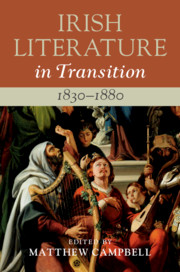Book contents
- Irish Literature in Transition, 1830–1880
- Irish Literature in Transition
- Irish Literature in Transition, 1830–1880
- Copyright page
- Contents
- Contributors
- Series Preface
- General Acknowledgements
- Acknowledgements
- Part I Contexts and Contents: Politics and Periodicals
- Chapter 1 Victorian Ireland, 1830–1880: A Transition State
- Chapter 2 Satire and Innovation between Dublin, Edinburgh and London
- Chapter 3 Young Ireland and Beyond
- Part II Ireland and the Liberal Arts and Sciences
- Part III From the Four Nations to the Globalising Irish
- Part IV The Languages of Literature
- Index
Chapter 3 - Young Ireland and Beyond
from Part I - Contexts and Contents: Politics and Periodicals
Published online by Cambridge University Press: 29 February 2020
- Irish Literature in Transition, 1830–1880
- Irish Literature in Transition
- Irish Literature in Transition, 1830–1880
- Copyright page
- Contents
- Contributors
- Series Preface
- General Acknowledgements
- Acknowledgements
- Part I Contexts and Contents: Politics and Periodicals
- Chapter 1 Victorian Ireland, 1830–1880: A Transition State
- Chapter 2 Satire and Innovation between Dublin, Edinburgh and London
- Chapter 3 Young Ireland and Beyond
- Part II Ireland and the Liberal Arts and Sciences
- Part III From the Four Nations to the Globalising Irish
- Part IV The Languages of Literature
- Index
Summary
Young Ireland emerged from a closely-knit group of young, middle-class Irishmen, initially allied to Daniel O’Connell’s Repeal movement but increasingly internally fractured by disagreements over their preferred version of Irish nationalism, and under siege from political rivals. Their newspaper, the Nation, founded in October 1842 by Charles Gavan Duffy, Thomas Davis, and John Blake Dillon, was both the organ and the crucible for their political and cultural agenda; their writings provoked attacks from both the conservative Catholic establishment, for whom the Young Irelanders were ‘Godless infidels’ promoting mixed education, and the British government, which prosecuted the editors of the Nation for sedition. Literature was, for the Young Irelanders, a powerful medium of nationalist education, and poetry and ballads particularly valuable means of teaching history. The Nation’s ‘Poet’s Corner’ hosted both well-known poets such as James Clarence Mangan, and launched the careers of Jane Francesca Elgee (the future Lady Wilde) and a number of other female poets initially accepted as curiosities and ‘auxiliaries’ by the editors, but becoming increasingly important to the paper’s readers. Through the Nation, its anthologies The Voice of the Nation and The Spirit of the Nation, and its Library of Ireland volumes of fiction and history, Young Ireland was to influence the future leaders of the Fenian movement, the Land League, and the Literary Revival.
Keywords
- Type
- Chapter
- Information
- Irish Literature in Transition, 1830–1880 , pp. 38 - 58Publisher: Cambridge University PressPrint publication year: 2020
- 2
- Cited by



